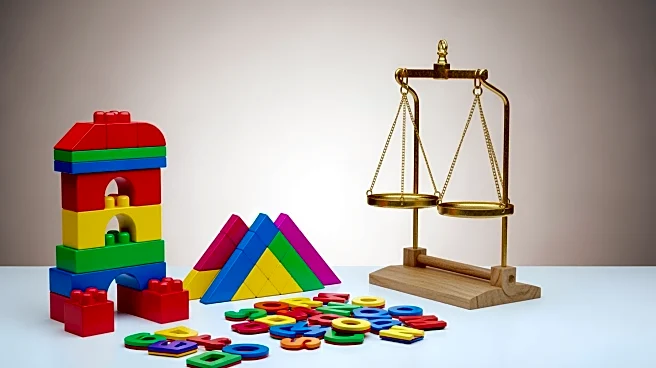What's Happening?
The U.S. Supreme Court is currently reviewing the legality of tariffs imposed by President Trump, which are being challenged by educational toy companies, Learning Resources Inc. and hand2mind Inc. These
companies argue that the tariffs, which have significantly increased costs, are beyond the president's authority as outlined in the International Emergency Economic Powers Act (IEEPA). The tariffs were imposed on imports from countries like China, Canada, and Mexico, citing emergencies such as fentanyl trafficking and trade imbalances. During the court proceedings, Chief Justice John G. Roberts Jr. and other justices expressed skepticism about the president's power to impose such tariffs without congressional approval, highlighting concerns about executive overreach.
Why It's Important?
The outcome of this case could have significant implications for U.S. trade policy and presidential authority. If the Supreme Court rules against President Trump, it may limit the executive branch's ability to unilaterally impose tariffs, reinforcing congressional control over taxation. This decision could affect various industries reliant on imports, potentially altering the economic landscape and trade relations. Educational toy companies, which have already shifted production to countries like Vietnam and India due to high tariffs, may face further challenges depending on the ruling. The case underscores the ongoing debate over the balance of power between the executive and legislative branches in economic policymaking.
What's Next?
A decision from the Supreme Court is expected by June next year. Depending on the ruling, there could be significant changes in how tariffs are imposed in the future, potentially requiring more congressional involvement. Stakeholders, including businesses affected by the tariffs, are closely monitoring the case, as it could lead to adjustments in trade strategies and supply chain management. Political leaders may also react, possibly advocating for legislative changes to clarify the scope of presidential powers under the IEEPA.
Beyond the Headlines
The case highlights broader constitutional issues regarding the separation of powers and the historical context of taxation authority. The debate touches on foundational principles from the American Revolution, emphasizing the importance of congressional control over revenue-raising measures. This legal challenge could prompt discussions on the need for clearer guidelines on emergency powers and their application in economic contexts, potentially influencing future legislative actions.









